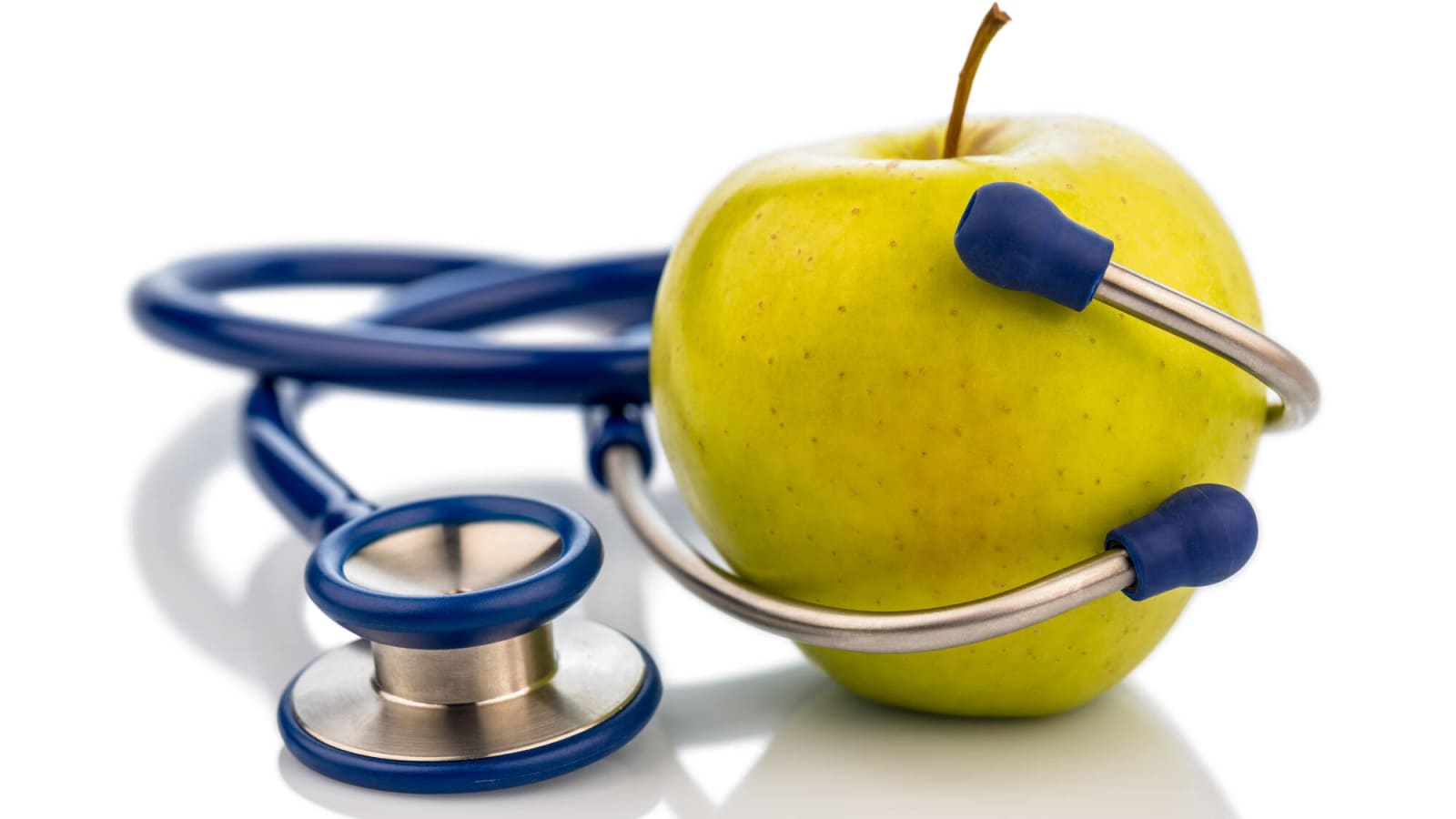There are a lot of common expressions in English — especially American English. And because food is such an important and diverse part of American culture, it’s no surprise that many foods have worked their way into some sayings. As a little food for thought, here are 25 foods that appear in famous sayings, idioms, and expressions.
Africa Studio / Shutterstock.com
With phrases like “as American as apple pie” in existence, it is no surprise that apples are part of numerous sayings and expressions in American English. For instance, if you want to talk about one person’s behavior ruining things for a larger group, you might say that “one bad apple can spoil the bunch.” Or, if you’re trying to promote a healthy diet that includes lots of produce, you could say “An apple a day keeps the doctor away.” These phrases live on because they continue to get passed on from parents to children — after all: “The apple doesn’t fall far from the tree.”
DronG / Shutterstock.com
Even if someone is vegan, vegetarian, or pescatarian, if they work for a living, someone might say they are “bringing home the bacon.” And if someone works at a pork processing plant with perks in addition to their paycheck, they may literally bring home some bacon.
The KonG / Shutterstock.com
If you accidentally or purposely tell a secret, you are said to have “spilled the beans.” If that information isn’t worth much — or if you want to refer to anything else as insignificant — you might also say that it “doesn’t amount to a hill of beans,” as beans have historically been cheap and easy to grow from an agricultural perspective.
New Africa / Shutterstock.com
If you’re the person in a relationship that, to borrow a previous phrase, brings home the most bacon, you could be referred to as the “breadwinner.” Similarly, going out to make money or find success is referred to as “getting that bread” in contemporary terminology. Bread has always been a staple food and a slang term for money, so of course it has worked its way into numerous phrases. In fact, it’s so important that you could say, as far as food goes, it’s the “bread and butter” of phrases and expressions.
October22 / Shutterstock.com
There are ample types of cake out there, and also multiple phrases that feature cake. If something is simple, it might be referred to as a “piece of cake” or just “cake.” In another use, if two desirable things are mutually exclusive, it evokes the expression: “You can’t have your cake and eat it, too.”
MaraZe / Shutterstock.com
The phrase “say cheese” has been used by photographers for almost a century simply because saying the word cheese causes a subject’s mouth to form the shape of a smile. (It works wonders for family photographers dealing with kids!) Fun food fact: Before smiling for the camera was commonplace, photographers would often advise subjects to say “prunes” because it made their mouths appear smaller, which was considered a more desirable look at the time.
Billion Photos / Shutterstock.com
If you want to talk about the best part of something — or an extra aspect that makes something that’s already good even better — you might refer to it as “the cherry on top.” This is obviously a reference to ice cream sundaes, which are composed of ice cream, loads of toppings, and whipped cream, but also feature a finishing touch of a maraschino cherry on top.
Moonborne / Shutterstock.com
Someone who is scared could be called a chicken, which originated from the assumption that hens are weak and skittish. People are also advised not to “count their chickens before they hatch,” which means they shouldn’t depend on something or start making plans based on something that isn’t yet certain. In other words, don’t assume an egg will eventually become a chicken. (We’ll hear more about eggs shortly…)
Steve Cukrov / Shutterstock.com
If someone is sharp, you might say they are a “smart cookie.” If they’re physically or emotionally strong, you might say they’re a “tough cookie.” And if all these sweet sayings make you want to throw up, you might say you’re going to “toss your cookies.”
271 EAK MOTO / Shutterstock.com
Cucumbers offer a cool addition to any salad, appetizer, or other meal, but temperature is not the point of the phrase “cool as a cucumber.” Instead, it is used to refer to a person who acts cool, calm, and collected.
mattesimages / Shutterstock.com
When people first started saying they would bet “dollars to donuts,” it meant they were so sure of themselves that they were willing to bet something valuable (dollars) against something cheap (donuts). People still use this phrase even though inflation over the last century has rendered it obsolete. Nowadays, even the cheapest donuts cost at least a dollar, and gourmet varieties can run you five or six times that amount.
Alen Ka / Shutterstock.com
Along with the terms “bacon,” “bread,” and “cheese,” another common slang term for money is “dough.” And like those terms, there’s also a phrase associated with it — and this one is a little punny. If you have a lot of money, you’re said to be “rolling in the dough.”
Nitr / Shutterstock.com
As promised, here’s another egg-related expression: Don’t put all your eggs in one basket. This phrase is often used for financial matters, as it encourages investors to diversify their stocks, savings, and other accounts. It can have a broader meaning beyond finance, too, as it’s rarely a good idea to risk everything on a single venture.
Pixelbliss / Shutterstock.com
Fish also have their share of expressions. When someone has a bad breakup, they are often consoled with the saying: “There are plenty of other fish in the sea.” In a more food-related adage, if someone has more important tasks or problems to deal with, they might say they have “bigger fish to fry.”
Aprilphoto / Shutterstock.com
If you find yourself on a time-wasting, hopeless pursuit of something — literally or figuratively — you might say you’re on a “wild goose chase.” This expression dates back hundreds of years, and a famous figure is often credited with first recording it! In the 1595 play “Romeo & Juliet,” William Shakespeare wrote: “Nay, if thy wits run the wild-goose chase, I have done, for thou hast more of the wild-goose in one of thy wits than, I am sure, I have in my whole five.”
Repina Valeriya / Shutterstock.com
“You can catch more flies with honey than vinegar,” the old adage says. There are more effective (and less gross) ways to actually catch flies nowadays, but the meaning of the phrase still rings true: You get more by being nice.
Dani Vincek / Shutterstock.com
This one’s a bit confusing. The phrase “cut the mustard” is used to talk about something that meets expectations or passes requirements. However, the similar-sounding phrase “pass muster” means the same thing. Just don’t say “cut the muster” or “pass the mustard,” unless, in the case of the latter, you’re asking someone to hand you a condiment.
Ermak Oksana / Shutterstock.com
It’s nuts how often we use various types of nuts in sayings and expressions! In addition to “nuts” being slang for “crazy,” the term “peanuts” can also be applied to a small amount of money. (E.g. “The job paid peanuts.”) And if a person (or a problem) is difficult to figure out, you could also say they (or it) is “a tough nut to crack.”
Apple_Mac / Shutterstock.com
We’ve already mentioned a couple of egg-related sayings, but this next one involves a meal you make with eggs. When something needs to be sacrificed in order to achieve something else — or there is a bit of collateral damage — it evokes the phrase: “You can’t make an omelet without breaking a few eggs.”
Artem Malov / Shutterstock.com
When someone tries to show that two things are vastly different, they say it’s like comparing “apples to oranges.” However, since these items are both types of round fruit that grow on trees, the phrase is best suited for comparing things that may appear similar but are in fact quite different. (Think a car versus an SUV, or a flip phone versus a smartphone.)
Svetlana Monyakova / Shutterstock.com
If a pair of people are especially close — as friends or romantically — some might say they are like “two peas in a pod.” This makes sense, as peas are held close together in a pod…except the average pod contains eight peas! If three is a crowd, then eight is way too many!
HandmadePictures / Shutterstock.com
Whether you’re told to take something “with a grain of salt” or “with a pinch of salt,” it means the same thing: Be skeptical, as the claim could be exaggerated or only partially true. This phrase may be the oldest in our list, as it at least dates back to Ancient Rome, circa the first century C.E. The expression is often attributed to famous figures like Pliny the Elder or Pompey the Great, but as these claims are not confirmed, it’s best to take them with a grain of salt.
YusufAslan / Shutterstock.com
Although most of these expressions are difficult to trace back to their origins, the line “a spoonful of sugar helps the medicine go down” (which can be taken literally or figuratively), does, in fact, originate from the 1964 Disney film “Mary Poppins.” However, the source of the phrase “give me some sugar,” an alternate way to ask for a kiss, is much murkier, although it is geographically attributed to the American South.
AndreyCherkasov / Shutterstock.com
When you don’t like something or are not a particularly big fan, you might say it’s “not my cup of tea.” Evidence suggests this expression probably came from England, but it may have first appeared in the positive sense — people referred to something they like as “my cup of tea.” For a more modern expression, people requesting juicy details or inside information might ask someone to “spill the tea,” “talk tea,” or some other phrase that uses “tea” as a synonym for “gossip.”
Brent Hofacker / Shutterstock.com
Americans have a whole holiday devoted to turkey (and being grateful for stuff, or something), so turkey expectedly appears in numerous slang terms and sayings. A turkey is someone who is inept or not appealing in any way, while the phrase “talk turkey” means to discuss something frankly. If you’d like to stop using any of these phrases, good luck because it may be hard to quit them cold turkey.

 +
+

































